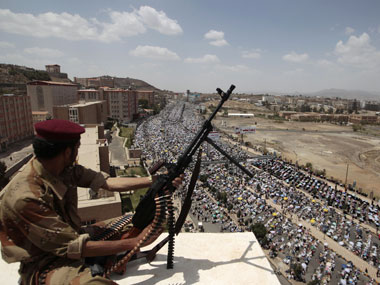The advance of the Shiite rebels, known as Houthis, threatens to plunge the Arab world’s poorest country, Yemen, into a civil war that has already drawn in its Gulf neighbours. Saudi Arabia and Gulf region allies launched military operations including air strikes in Yemen on Thursday, officials said, to counter Iran-allied forces besieging the southern city of Aden where the US-backed Yemeni president had taken refuge. [caption id=“attachment_2174849” align=“alignleft” width=“380”] Representational image. Reuters[/caption] The entire crisis in Yemen began when the Houthis emerged as the dominant faction by seizing Sanaa, the capital of Yemen, from the government in September 2014. The Houthis are named after a Zaydi tribe based in the city of Saada. The Houthis captured Sanaa on 21 September after four days of fighting with soldiers loyal to the government of the Sunni majority country. This happened despite a UN-brokered peace agreement between the government and the Houthis. Many link the Houthis to regional Shiite power Iran, though the rebels deny they are backed by the same. In January 2015, the Houthis stormed and took over the presidential palace in Sanaa. On 22 January, Yemen’s President Abd-Rabbu Mansour Hadi expressed readiness to accept demands for constitutional change and power sharing with Houthi rebels who took up positions outside his home after defeating his guards in two days of battle. Hadi had come to power in Yemen in late 2011 due to the Arab Springs uprising, after which the then President Ali Abdullah Saleh had agreed to step down and hand over power to Hadi. Saleh had been ousted after 33 years at the head of Yemen. A day after expressing readiness to accept the demands of the Houthi, Hadi resigned soon after a Houthi rebel takeover of the country. He was placed under house arrest. However, in February, Hadi escaped and fled to Aden in south Yemen. He also appeared to rescind his resignation and attempted to reclaim his position as President. Describing the Houthi takeover of Sanaa as a “coup”, Hadi said all moves made since then, a period in which the Houthis forced him to accept a power sharing agreement and later dissolved the parliament and set up a new ruling council, were illegitimate. The United Nations warned that Yemen was on the brink of civil war and the United States, Britain and France closed their embassies in Yemen and urged their citizens to leave the country amid turmoil after Shiite rebels seized power. On 20 March, suicide bombers killed at least 137 worshippers and wounded hundreds more during Friday prayers at two mosques in Sanaa, in coordinated attacks claimed by Sunni extremist group Islamic State. The attacks on mosques – frequented by supporters of the Shi’ite Muslim Houthi fighters – were the deadliest in a years-long campaign of violence in the country, where US had been waging a drone air war against a local branch of the Sunni Muslim militant group al Qaeda. A day after the incident, on 21 March, the US withdrew all its forces from Yemen, citing the deteriorating security situation as the reason. On 25 March, Hadi fled from Aden to an undisclosed location outside Yemen just hours after the rebels’ own television station said they seized an air base where US troops and Europeans advised the country in its fight against al-Qaida militants. Yemen’s state television broadcaster, controlled by Houthis, made an offer of some $100,000 for Hadi’s capture. On the same day, the Indian Ministry of External Affairs advised all Indians in Yemen to take the first commercial flight out of the country. It was after this that Saudi Arabia and Gulf region allies launched military operations in Yemen. Gulf broadcaster al-Arabiya TV reported that the kingdom was contributing as many as 150,000 troops and 100 warplanes to the operations and that Egypt, Jordan, Sudan and Pakistan were ready to take part in a ground offensive in Yemen. The crisis now risks spiralling into a proxy war with Shia Iran backing the Houthis, and Saudi Arabia and the other regional Sunni Muslim monarchies supporting Yemeni President Abd-Rabbu Mansour Hadi. (With agency inputs)
The advance of the Houthis threatens to plunge the Arab world’s poorest country, Yemen, into a civil war that has already drawn in its Gulf neighbours.
Advertisement
End of Article


)

)
)
)
)
)
)
)
)



